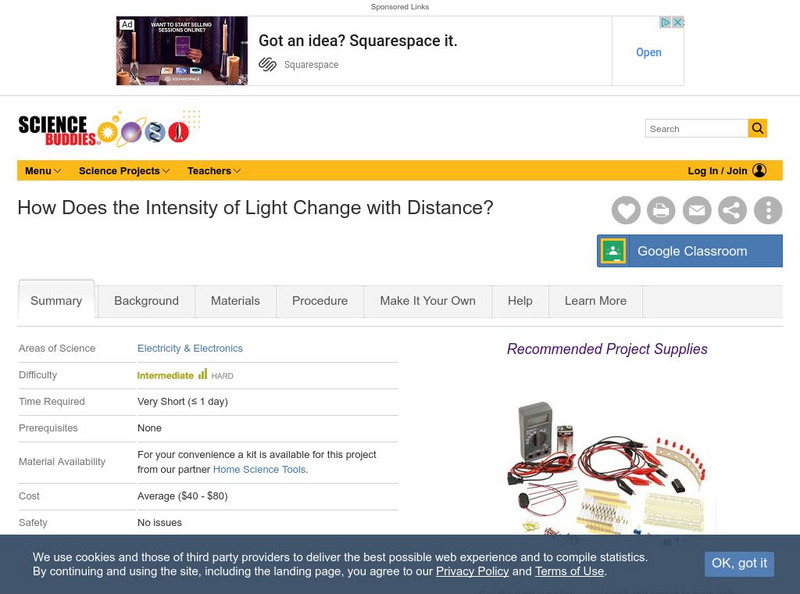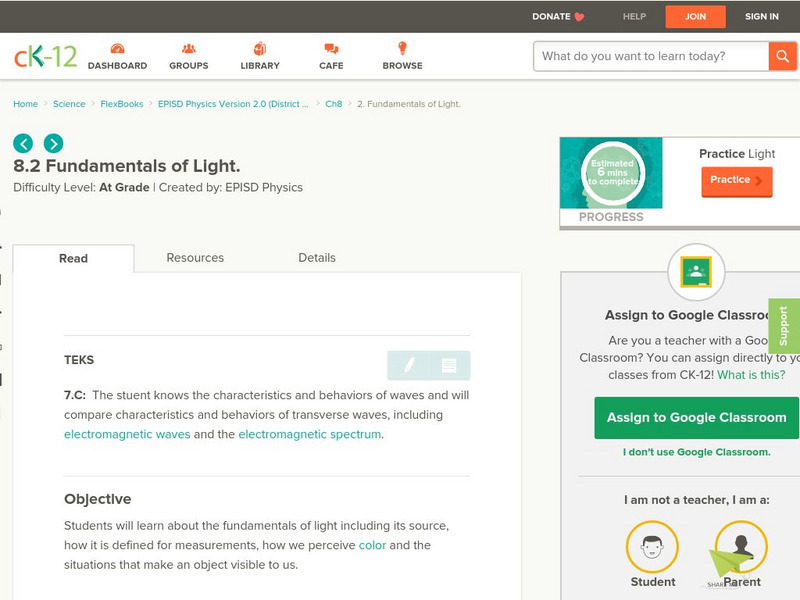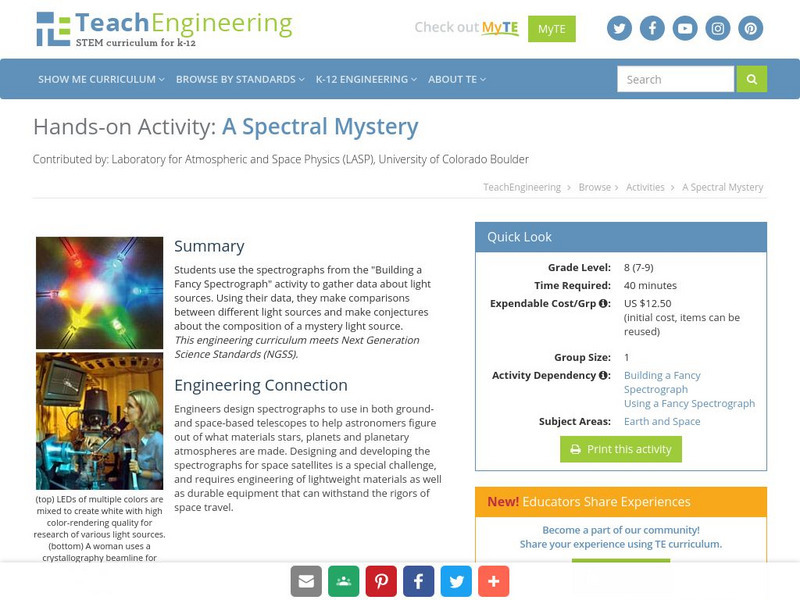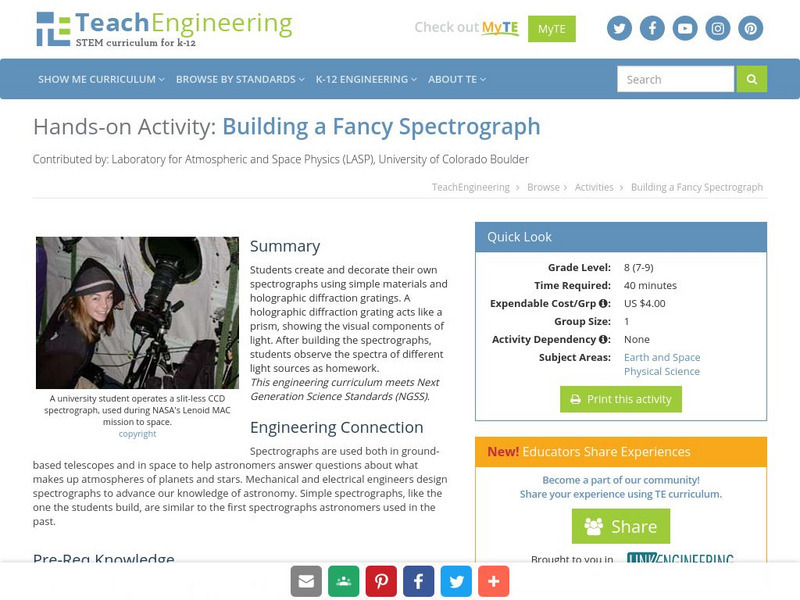Science Buddies
Science Buddies: Project Ideas: Grow Fungi That Fires at Light Sources
In this science fair project, grow a culture of Pilobolus fungus and experiment with its ability to shoot spore sacs at light sources. The Science Buddies project ideas are set up consistently beginning with an abstract, objective, and...
Science Buddies
Science Buddies: How Does the Intensity of Light Change With Distance?
How far would you have to travel so that the light of the full sun would provide "daylight" no brighter than twilight on Earth? This project describes a method to verify the inverse square law: how light, sound, electrical signals, and...
TeachEngineering
Teach Engineering: Pictures Please: Traveling Light
In this lesson, students learn that light travels in a straight line from a light source and that ray diagrams help us understand how an image will be created by a lens. In the accompanying activity, students explore the concepts behind...
CK-12 Foundation
Ck 12: Fundamentals of Light
[Free Registration/Login may be required to access all resource tools.] Students investigate the fundamentals of light including its source, how it is defined for measurements, how we perceive color, and the situations that make an...
eSchool Today
E School Today: Your Cool Facts and Tips on Light Pollution
What is light pollution and why should we care about it? Learn what it is, the different types, sources of this type of pollution, the impact it has, and ways to combat it.
TeachEngineering
Teach Engineering: A Spectral Mystery
Students use the spectrograph from the "Building a Fancy Spectrograph" activity to gather data about light sources. Using their data, they make comparisons between different light sources and make conjectures about the composition of a...
TeachEngineering
Teach Engineering: Using a Fancy Spectrograph
Students use the spectrograph from the "Building a Fancy Spectrograph" activity to gather data about different light sources. Using the data, they make comparisons between the light sources and make conjectures about the composition of...
TeachEngineering
Teach Engineering: The Visual Spectrum
In this activity, students make simple spectroscopes (prisms) to look at different light sources. The spectroscopes allow students to see differing spectral distributions of different light sources.
Physics Classroom
The Physics Classroom: Light Waves and Color: The Path Difference
After looking at a representative two-point source interference pattern with accompanying order numbers, students investigate the rationale behind the numbering system, and develop some mathematical equations that relate the features of...
TeachEngineering
Teach Engineering: Building a Fancy Spectrograph
Students create and decorate their own spectrographs using simple materials and holographic diffraction gratings. A holographic diffraction grating acts like a prism, showing the visual components of light. After building the...
The Wonder of Science
The Wonder of Science: 1 Ps4 2: Illumination and Darkness
This NSTA vetted source includes resources to allow students to make observations that prove objects in darkness need light to be illuminated. Included are assessment ideas, videos, examples, lesson plans, and photos of student work.
US National Archives
Nara: Teaching With Documents: Telephone and Light Patent Drawings
A lesson plan about Alexander Graham Bell's patent for the telephone and Thomas Edison's patent for the electric lamp. Contains good background information and historically pertinent documents. It also discusses the role corporations...
PBS
Pbs Learning Media: Thomas Edison: Inventor and Entrepreneur
Through a video and primary source activities, students will learn about Edison's remarkable business of innovation and some of his 1,093 patented devices.
Utah Education Network
Uen: I'm So Bright! I Wear My Shades Indoors!
This lesson engages students in learning about light through multiple sources. Students will learn how light is produced, reflected, refracted, and separated. Students will communicate their findings through an independent project that...
TeachEngineering
Teach Engineering: Energy Conservation
Students are introduced to the idea that energy use impacts the environment and our wallets. They discuss different types of renewable and nonrenewable energy sources, as well as the impacts of energy consumption. Through a series of...
PBS
Pbs Teachers: Scientific American: Spider Web Making Stratagems
Investigate spiders in Panama that use UV-reflecting silk in their webs to attract their prey. Build a device that traps flying insects, experimenting with different light sources to choose the best lure.
Utah Education Network
Uen: Our Friend, the Sun
Understand the role of the sun as the source of heat and light for living things on earth.
Utah Education Network
Uen: Managing Heat
Understand the role of the sun as the source of heat and light for living things on earth.
TeachEngineering
Teach Engineering: Completing the Circuit
In the everyday electrical devices we use - calculators, remote controls and cell phones - a voltage source such as a battery is required to close the circuit and operate the device. In this hands-on activity, students use a battery,...
Other popular searches
- Natural Light Sources
- Sources of Light
- Science and Light Sources
- Science Light Sources
- Childrens Light Sources
- Alternative Light Sources
- Man Made Light Sources
- Secondary Light Sources
- Chileans Light Sources
- Children's Light Sources
- Chilrens Light Sources
- Natural Sources of Light














